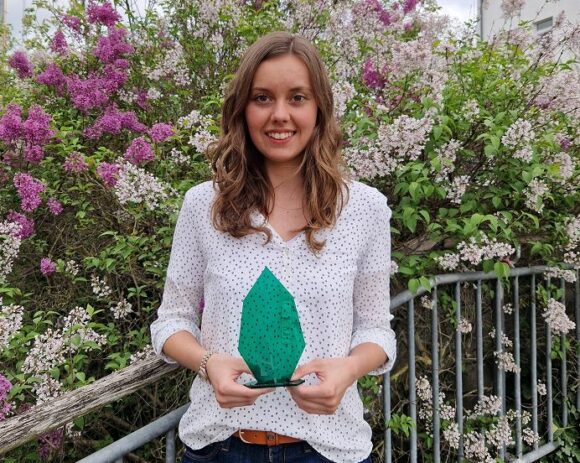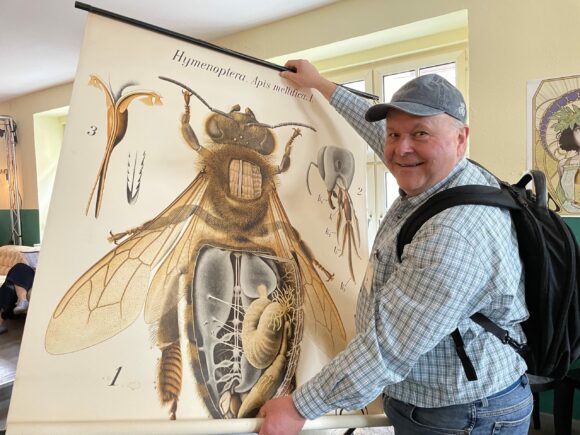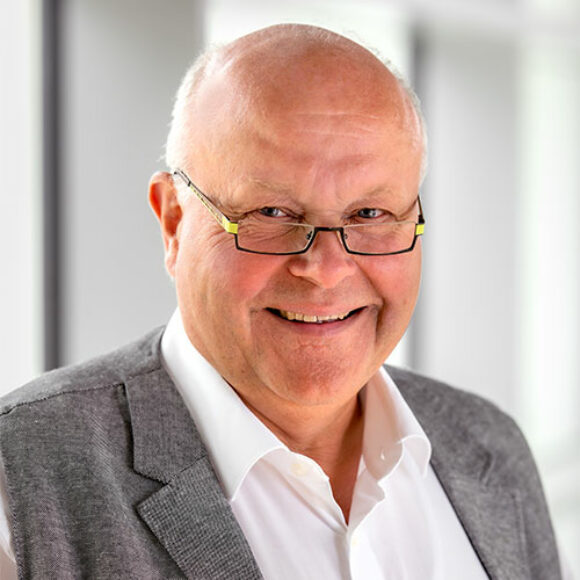4 months ago, the newly founded Institute for Sustainable Water Systems (inwa) at Hof University of Applied Sciences started its work. Under its umbrella, the research groups “Water Infrastructure and Digitalization”, “Photonics and Water”, “Sustainability and Project Management in Water Management” and “Resource Efficient Food Production” have come together and are committed to a sustainable and holistic approach to the most important foodstuff, water. Prof. Günter Müller-Czygan, as head of the “inwa”, provides information on the state of development and initial projects.

Prof. Müller-Czygan, what is the status of the restructuring?
“Even though the colleagues in the research groups are currently still spatially distributed across different buildings, we are working closely together and coordinating many aspects of content and organization in good time. In the meantime, the university management has granted us the necessary funds for the organization of the institute, for which we would like to express our sincere thanks once again. Now we are able to equip the institute with personnel and material. We have also been able to set up a regular meeting of the staff. Here, the institute’s management reports on news and the colleagues report on their projects and present their ideas for the institute’s further development. My personal thanks at this point go to the heads of our research groups and to all colleagues who have placed their trust in me as the new institute director.”
How many employees work for the new institute and what are their tasks?
“The work of the institute is supported by a research coordinator as well as an assistant – the positions will be officially filled successively from 01.09.2023. The focus of these functions is on the one hand the organization of the formal institute processes, on the other hand the support of the research groups in funding projects as well as the identification of ongoing funding projects and new funding priorities. In addition, there will soon be a 1-year position for the topic of water self-sufficiency – here, the person yet to be selected will look into the potentials of water resource efficiency and reuse at the university and develop implementation proposals. We will also receive further support in the area of communications during the course of the year. I would also like to mention that the research group leaders regularly coordinate closely with each other and thus the inwa is a clear representation of the research groups.”

Do you have the impression that the new structure has already been received internally and externally – for example, in the business community?
“From the talks I have had so far, I have perceived that the region’s partners from industry and the community in particular have taken note of the division of the old Institute for Water and Energy Management and can also understand it well. So far, there has been nothing but positive feedback, especially in view of the water problems resulting from climate change. One is pleased that there is a clearly visible water expertise at Hof University of Applied Sciences, this is also confirmed by an increasing contact with inwa with different current issues.”
Research activity remains high: among other things, there are probably three newly approved projects in the starting blocks. What exactly are they about?
“In the broadest sense, all three new projects are concerned with innovative measures for securing water resources in the future. This involves the removal of so-called trace substances from water, for example in order to use treated wastewater as a substitute for expensive drinking water in special cases.
- In the “Rubin – PhoTech” project , funded by the German Federal Ministry of Education and Research, the “Photonics and Water” research group headed by Prof. Dr. Tobias Schnabel is working on the further development of photocatalysts through additive manufacturing and new coating systems. Here, Prof. Schnabel is exploring new ways to remove pollutants from water and air using specially coated glass spheres that trigger a chemical reaction to break down pollutants through solar radiation alone. While the vast majority of process solutions for the removal of so-called trace substances (e.g. drug residues) require a great deal of energy, solar photocatalysis enables virtually energy-free pollutant reduction.
- The other two projects, “ReUse” and “IntelliFluQs,” belong to my research group “Water Infrastructure and Digitalization.” In “ReUse”, funded by the Deutsche Bundesstiftung Umwelt and the Oberfrankenstiftung, the focus is on the digital, intelligent networking of different process solutions for the removal of trace substances with the use of renewable energies. Currently, control systems in wastewater processes operate independently of the availability of energy, especially when renewable energies are used. Based on a test plant in real operation at the Scheid wastewater treatment plant in the town of Waldeck am Edersee (North Hesse), it will be investigated how wastewater process technologies can be controlled in such a way that the available (renewable) energy can be optimally utilized and, in the ideal case, 100% energy supply is possible through renewable energies. Battery storage systems will also be used in this context.
- The “IntelliFluQs” project is funded by the German Federal Ministry for Economic Affairs and Climate as part of the ZIM SME program. A new type of control module is being developed for wastewater process stages for the removal of trace substances, which can use artificial intelligence to selectively set different cleaning results. Currently, such process stages are set to achieve maximum cleaning results, which requires a correspondingly large amount of energy. As mentioned, we expect a strong increase in the area of wastewater reuse. However, the same water quality does not always have to be provided for the various uses. If treated wastewater is needed to clean canal systems, for example, a lower cleaning quality is required than if the water is used for irrigation purposes. Based on data from the wastewater reusers, the new control module calculates what wastewater quality is required, adjusts the process to this target value and “produces” the desired wastewater. In this way, only as much energy is used as is actually needed.
In addition, we expect to receive more funding decisions in the coming weeks from our application activities over the past 6-12 months.”
That’s very good news. Where do you see inwa in a year?
“The topic of water is pushing itself more and more into the center of societal debates due to the rapid increase of climate change impacts.
Whereas just 2-3 years ago only the danger from heavy rainfall/flooding was in the focus of public debates, concerns about water scarcity due to increasingly extreme and prolonged periods of drought are growing strongly. With the new projects presented, we are making an important point when it comes to water resource security in the course of climate change adaptation.
Prof. Günter Müller-Czygan
Another aspect in relation to water is securing our foundations for resource-conserving food production, which is what Dr. Harvey Harbach is concerned with in his research group. Currently, the greatest demand is in the area of the so-called sponge city/region, where municipalities and cities in our region in particular are looking for effective solutions to deal with the complexity of the consequences of weather extremes. Prof. Dr. Manuela Wimmer, head of the research group “Sustainability and PM in Water Management” and I are currently preparing the foundation of a new competence and transfer center “Sponge Region”, which for the first time will focus on sustainable and holistic solutions for dealing with weather extremes, including the development of new analysis and planning methods. Against the background of these aspects, I expect that in a year’s time, inwa will be able to play a special role with regard to the topic of water and climate change in Bavaria and beyond.”
Thank you very much!







